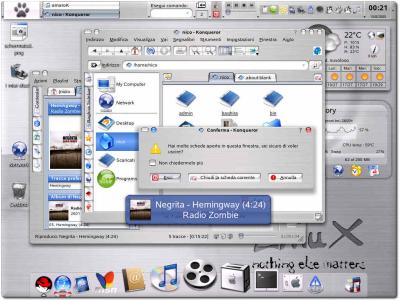Tuesday, August 1st, 2006, 8:07 am
Why Linux?

Linux with KDE in its Baghira glory
Penguiniator expained this rather nicely in news:comp.os.linux.advocacy only days ago.
No anxiety over spyware in the form of “critical updates” that phones home to verify that your copy is legit. No danger that your software is tied to a company’s fortunes. No clandestine third party programs that disable your hardware when you “misuse” “their” music CD’s. No malware that turns your computer into an email zombie or that harvests contacts from your address book. No mysterious changes in your computer’s settings. No extra charges for bug fixes that are labelled as upgrades. No help files that are sprinkled liberally with marketting drivel. No need to reboot every time a new program is installed or updated. No artificial limitations placed on what you can do with your software, such as automating tasks, giving away your software, installing it on as many computers as you want, using it for commercial and non-commercial purposes. No need to relearn everything you knew about computers when your software vendor decides to replace the user interface with one that it promises will make you a more efficient user. No need to upgrade your applications just because you decide to upgrade your operating system. No need to upgrade your operating system just because you decide to upgrade your applications. And no need to look over your shoulder while you desperately try to stay ahead of rapidly approaching hardware obsolescence in the process.
When you learn a program, that knowledge remains valid for a very long time. File formats and communications protocols are open. Competition between developers is usually friendly and benefits everyone, especially end users. Availability of software is limited less by the financial resources of the user than with proprietary software. Users have direct access to developers and can influence the future development of their software. Technical support is more accessible and better organized than with proprietary counterparts via FAQ’s, how-to’s, Usenet, Web forums, wiki’s, IRC channels and email. Help files are more honest about a program’s shortcomings, listing known bugs and work-arounds for them. And it’s fun.






 Filed under:
Filed under: 